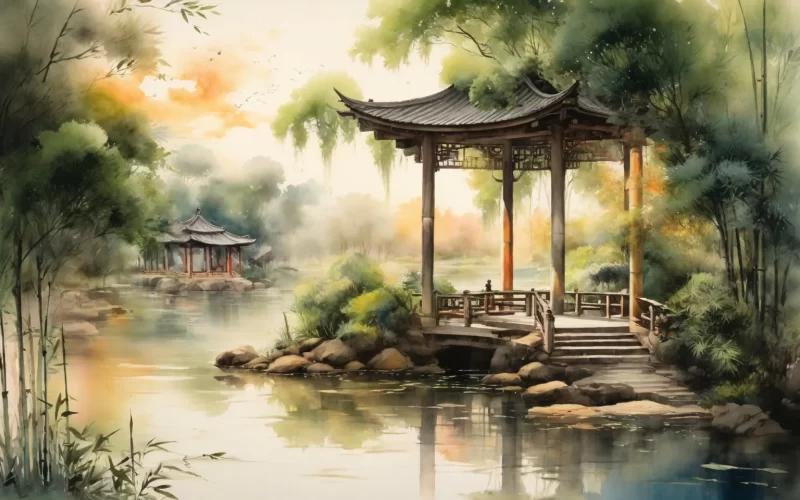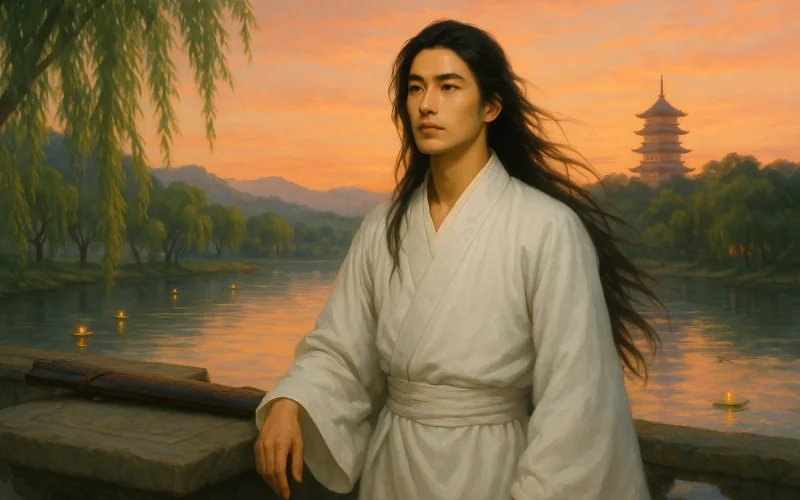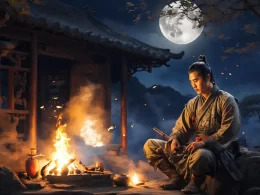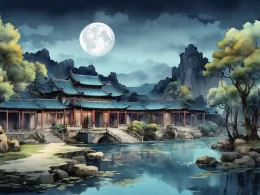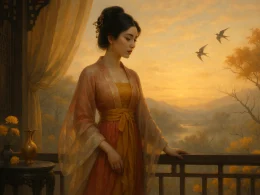The mountain-light suddenly fails in the west,
In the east from the lake the slow moon rises.
I loosen my hair to enjoy the evening coolness
And open my window and lie down in peace.
The wind brings me odours of lotuses,
And bamboo-leaves drip with a music of dew…
I would take up my lute and I would play,
But, alas, who here would understand?
And so I think of you, old friend,
O troubler of my midnight dreams!
Original Poem
「夏日南亭怀辛大」
孟浩然
山光忽西落,池月渐东上。
散发乘夜凉,开轩卧闲敞。
荷风送香气,竹露滴清响。
欲取鸣琴弹,恨无知音赏。
感此怀故人,中宵劳梦想。
Interpretation
This poem was composed during Meng Haoran's period of reclusion in Xiangyang. "Ding the Elder" refers to Ding Feng, a close friend and fellow poet from Meng's hometown. The two often roamed the mountains and rivers together, sharing a deep bond. On this evening, the poet had made plans to meet Ding Feng at Master Ye's mountain lodge. As sunset approached, Meng waited alone, the anticipation gradually giving way to a quiet sense of loss amidst the deepening twilight. This piece captures that suspended moment between expectation and solitude.
By this time, Meng Haoran had long abandoned his ambitions for an official career in Chang'an. Living the life of a common scholar between Lumen Mountain and his riverside garden, his existence seemed defined by the lines: "I should but guard this solitude of mine, / And close once more my rustic cottage door." Outwardly, he appeared at peace with farming, study, and the companionship of nature. Yet this tranquility was not without its undercurrents. In the mountain stillness, waiting for a friend who did not arrive, the loneliness momentarily veiled by daily contentment quietly surfaced. The poem’s subtle power lies in this delicate equipoise: the poet finds profound beauty in solitude, yet within that beauty, feels the pang of a friend's absence.
First Couplet: "夕阳度西岭,群壑倏已暝。"
Xīyáng dù xī lǐng, qún hè shū yǐ míng.
The setting sun passes behind the western ridge; / In a breath, all valleys are swallowed by twilight.
The poem opens with a grand yet quiet panorama of dusk. "Passes behind" personifies the sun, giving its descent a sense of deliberate, solemn finality. "In a breath" captures the startling swiftness with which twilight consumes the landscape—one moment there is light, the next, profound shadow. This sharp contrast between the sun's gradual passage and the valleys' sudden darkening masterfully renders the inexorable and startling arrival of night in the mountains. The poet, positioned as the observer, is framed within this vast, shifting canvas of light and shadow, his solitude and anticipation already palpable in the silence.
Second Couplet: "松月生夜凉,风泉满清听。"
Sōng yuè shēng yè liáng, fēng quán mǎn qīng tīng.
Through pines, the moon begets the evening's chill; / Wind in the springs fills listening with a crystal thrill.
As visual darkness falls, the poet's other senses awaken. The coolness of the night is not merely felt but is "begotten" by the moonlight filtering through the pines—a synesthetic marvel that makes the coolness seem to emanate from the visual scene itself. Meanwhile, the sound of wind rustling through mountain springs doesn't just reach the ear; it "fills listening." This phrasing transforms hearing from a passive sense into a vessel being filled to overflowing with pristine, crystalline sound. These two lines exemplify Meng Haoran's genius for immersive, embodied perception. The poet doesn't just observe the environment; he becomes a receptacle for its sensory impressions—coolness and sound permeate his very being. The lodge is no longer just a location but the focal point where the essence of the mountain night converges.
Third Couplet: "樵人归欲尽,烟鸟栖初定。"
Qiáo rén guī yù jìn, yān niǎo qī chū dìng.
Woodcutters heading home are nearly gone from sight; / Through mist, birds settle on their roosts as falls the night.
The focus shifts from the natural elements to traces of other beings, emphasizing the poet's singular presence. The woodcutters, representatives of daytime human activity, vanish into the twilight. The birds, their forms softened by the rising evening mist, find their perches and grow still. "Nearly gone" and "settle… as falls the night" depict a world completing its transition from the busy day to the stillness of night. This completion of others' journeys—the woodcutters returning home, the birds settling to rest—inverts and highlights the poet's own state of suspension. Everyone and everything else is arriving at its destination or rest, while he remains in a state of waiting, his own journey (the anticipated meeting) unconcluded. The gathering mist mirrors the gathering solitude.
Fourth Couplet: "之子期宿来,孤琴候萝径。"
Zhī zǐ qī sù lái, gū qín hòu luó jìng.
My friend, you pledged to come and share this night; / A lone lute waits on vine-entangled paths, bereft of light.
Here, the reason for the vigil is revealed, and the poem's emotional core crystallizes. "My friend, you pledged" carries the weight of a promised companionship that now defines the evening's emptiness. The final image is one of poignant stillness and profound lyricism: "A lone lute waits on vine-entangled paths." The lute, an instrument of shared harmony and communication, is personified. It "waits," just as the poet waits, but it is "lone." It waits not in the lodge but on the paths outside, tangled with vines, suggesting both the passage of time and the natural world beginning to reclaim the unused way. The lute, the poet, and the path merge into a single emblem of patient, unfulfilled anticipation. The friend's absence is never lamented aloud; instead, it permeates the scene, felt in the cool air, heard in the full silence after the wind-springs' song, seen in the empty, darkening path.
Overall Appreciation
This poem is a masterpiece of atmospheric suggestion and emotional restraint. Unlike works that chronicle a journey or proclaim a philosophical stance, it captures a single, extended moment of suspended time and deepening solitude. The structure is a gradual narrowing of focus: from the vast panorama of sun and valleys, to the sensory immediacy of moon-cool and wind-sound, to the vanishing figures of woodcutters and birds, and finally to the solitary, still-life tableau of the poet and his lute on a dark path. This movement mirrors the mind's focus turning inward as the external world slips into darkness.
The poem's dominant mood is not one of bitter disappointment but of a quiet, almost serene melancholy. The world described is intensely beautiful—the moonlit pines, the sounding springs—and the poet is fully receptive to that beauty. Yet, the anticipated sharing of this beauty is what is missed. The loneliness is thus framed not as a void, but as the subtle shaping presence of an absence within a scene of fullness. It is the loneliness of a rich experience that longs for a witness.
Artistic Features
- Mastery of Temporal Pacing: The poem is a study in the perception of time. The swift "breath" of the valleys darkening contrasts with the slow generation of "evening's chill" and the gradual settling of the birds. This culminates in the static, enduring wait of the final line, making the friend's absence feel both sudden and prolonged.
- Synesthetic and Personifying Imagery: Sensations blend seamlessly ("moon begets… chill"), and objects are imbued with intention (the sun "passes," the lute "waits"). This technique dissolves the boundary between the observer and the observed, pulling the reader into the poet's unified sensory and emotional field.
- Emotion through Atmosphere and Juxtaposition: The poet's feelings are never stated directly. They are conveyed entirely through the crafted atmosphere and through potent juxtapositions: the woodcutters' return vs. his static wait; the birds finding rest vs. his unresolved vigil; the vibrant sensory world vs. the silent, unused "vine-entangled path."
- The Resonant, Open-Ended Conclusion: The poem ends on an image, not a statement. "A lone lute waits" is an action suspended in time. It invites the reader to dwell in that moment of waiting, to feel the coolness, hear the lingering silence, and share in the quiet, uncomplaining anticipation. The friend's arrival is neither confirmed nor denied; the poem lives in the fertile space of "not yet."
Insights
This poem offers a profound meditation on anticipation, solitude, and the beauty that persists in absence. In an age obsessed with connectivity and instant gratification, Meng Haoran's poem values the dignity of waiting and the richness of solitary perception. The poet is not depicted as anxiously pacing or lamenting his poor luck. He is present, attentive, and deeply engaged with the world around him, even—or especially—in his state of waiting.
The poem suggests that our deepest experiences of connection are often forged in moments of apparent disconnection. The friend's absence becomes the space into which the entire mountain night pours—its sights, sounds, and feelings. In remembering his friend, the poet perceives the world more acutely. The "lone lute" is not a symbol of futility, but of faithful readiness. It waits on the path, still capable of song, just as the poet's spirit remains open to both the beauty before him and the companionship that may yet come. In the end, the poem finds a strange completeness in the incomplete, teaching us that to wait attentively is itself a form of fullness.
Poem translator
Kiang Kanghu
About the poet
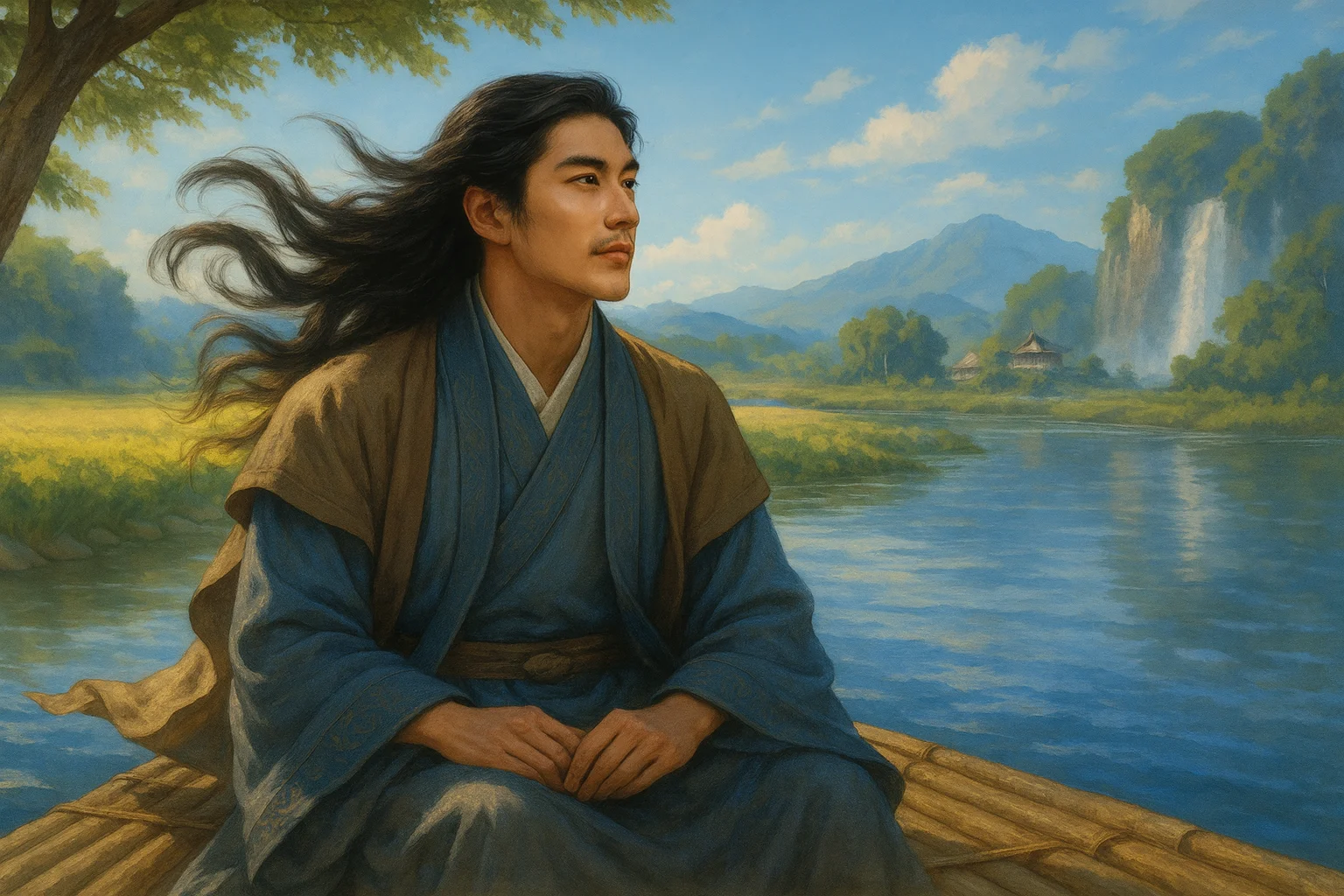
Meng Haoran (孟浩然), 689 - 740 AD, a native of Xiangyang, Hubei, was a famous poet of the Sheng Tang Dynasty. With the exception of one trip to the north when he was in his forties, when he was seeking fame in Chang'an and Luoyang, he spent most of his life in seclusion in his hometown of Lumenshan or roaming around.






